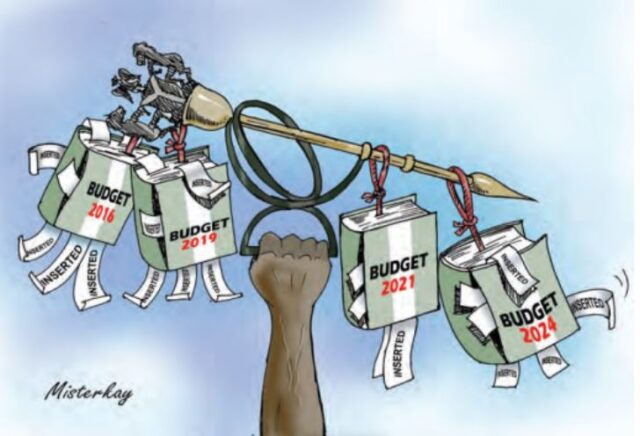The startling revelation made by Senator Abdul Ningi regarding the padding of Nigeria’s 2024 budget by over 3.7 trillion naira may have come as a bombshell because of its sheer volume and audacity!
However, budget padding and invidious subterranean increases in budget subheads has been a frequent occurrence in Nigeria since the restoration of democracy on 29 May 1999.
Even the then President Obasanjo in many speeches as far back as 1999 to 2007 riled against such unpatriotic practices by the National Assembly.
Surprisingly, budget bloating became more alarmingly pronounced in the Buhari Presidency despite President Buhari’s self-advertised aversion to corruption.
In 2016, allegations of budget padding by the National Assembly came up as a major scandal that eventually saw the removal of the then chairperson of the House of Representatives Committee on Appropriation, Abdulmumini Jibrin, from office on 20 July that year.
Jibrin had alleged that the then speaker of the House of Representatives, Yakubu Dogara, and three other officials fraudulently short-changed the House and abused their offices by taking away N40 billion out of the N100 billion allocated for constituency projects and distributing same to themselves. Jubrin was removed because he snitched on the NASS leadership who continued as if nothing untoward had happened!
That year also, some projects worth N480 billion were discovered to have been fraudulently inserted in the budget during the defence sessions.
While signing the 2019 Appropriation Bill of N8.92 trillion into law, former President Muhammadu Buhari accused the National Assembly of raising the budget by N90 billion. The former president said the increment would make it difficult to achieve the objectives of his government’s Economic Recovery and Growth Plan (ERGP).
The following year, 2020, Buhari raised concerns about projects inserted into that year’s budget by the National Assembly. The legislature had increased the budget by about N264 billion. The president said projects were added to the budgets of MDAs for unpatriotic reasons and that the action would trigger incremental recurrent expenditure.
In 2021, the National Assembly reportedly padded the federal budget by over N500 billion. Buhari, had proposed to the lawmakers N13.08 trillion. But during the budget vetting process, the lawmakers arbitrarily increased it to N13.6 trillion, an increment of over N500 billion.
In 2022, Buhari lamented some changes, major additions and reductions made by the lawmakers “without justification,” while assenting to the 2022 budget. Among them were an increase in projected federal government independent revenue by N400 billion, reduction of the provisions for the non-regular allowances of the Nigerian Police Force and the Nigerian Navy by N15 billion and N5 billion, respectively.
He also frowned at the new provisions totalling N36.59 billion for National Assembly projects in the Service Wide Vote. Buhari said most of the projects inserted relate to matters that are the responsibilities of state and local governments.
While signing the 2023 Appropriation Bill into law on 2 January, Buhari observed that new projects worth about N770.72 billion were inserted by the federal lawmakers while estimates made by MDAs were increased by about N58.55 billion.
The Latest Budget Scandal
The latest budget padding scandal did not start with a bang. It was never initially brought to the floor of the Senate months after President Bola Tinubu had signed the 2024 Appropriation Bill into law.
It sneaked in quietly, when the Northern Senators Forum resolved to meet President Bola Ahmed Tinubu over the alleged N3.7 trillion insertion in the 2024 budget.
The chairman of the forum, Senator Abdul Ningi (PDP, Bauchi Central), had disclosed this during an interview with the BBC Hausa Service.
He alleged that what the Senate debated and passed as budget for 2024 was N25 trillion and not the N28 trillion being implemented by Tinubu.
Ningi said the forum would probe the “added sum of N3 trillion” and other inclusions in the budget that were not known to the Senate.
The BBC Hausa Service interview unsettled the Senate leadership and there was desperation to ‘teach Ningi a lesson.’ That determination must have been so strong and supported by the Presidency that most of the Northern Senators who were part of the meeting that was earlier held with Senate President ‘chickened out’ and threw Ningi under the bus.
However, if the Senate thinks that his suspension would bring the matter to an end, they were wrong. Ningi had already opened a can of worms.
It was Senator Adams Oshiomhole representing Edo North that captured the mood aptly when he said that Ningi’s BBC interview had already stripped the Senate naked in the market place.
More so, revelations were made at the Senate plenary, which indicated that ranking senators got N500m each for their constituency projects in the 2024 budget.
Senator Jarigbe Jarigbe, during the debate of the motion on breach of privilege moved by Senator Olamilekan Adeola against Senator Abdul Ningi over Ningi’s interview with the BBC, alleged that senior senators got N500m each.
There were also allegations that the government approved the sum of N2.5billion for Senate President, Akpabio to procure deep freezers, generators and other items as empowerment projects for the people of his constituency.
A screenshot of the budget shared by a popular social media critic, Mahdi Shehu on X also revealed that the Federal Ministry of Women’s Affairs inserted five different empowerment projects for the people of Akwa Ibom North West Senatorial District at the sum of N500,000,000 each.
You can see that Ningi’s suspension and the allegations he had made raised more questions than answers. This is because the Senate has not addressed vital issues emanating from his allegation of the 2024 budget padding. And if indeed the report from BudgIT is true, that there is about N3.7trn without any detailed project allocations, the Senate had no choice but to do more detailed work of channelling these funds into the critical areas of development – education, health and pulling people out of poverty.
At this juncture Senators Ningi and Jarigbe deserve our commendations for their courage to speak out and “shame the devil.”
Consequences Of Budget Padding
Budget padding distorts the allocation of resources, diverting funds away from critical sectors such as education, healthcare, and infrastructure towards projects that may not benefit the public. This misallocation hampers economic development and exacerbates inequality, as resources fail to reach those in need.
Also, budget padding erodes public trust in government institutions, as citizens lose faith in the integrity of the budgetary process. When funds are siphoned off through padding, the government fails in its duty to serve the public interest, leading to disillusionment and apathy among citizens. The injection of unauthorized funds into the budget can fuel inflationary pressures, as excess liquidity floods the economy. This inflation erodes the purchasing power of citizens, particularly those on fixed incomes, leading to a decline in their standard of living. It undermines economic growth by diverting resources away from productive investments. Vital infrastructure projects, job creation initiatives, and poverty alleviation programmes are deprived of funding, hindering the nation’s progress and perpetuating cycles of poverty.
Budget padding fosters a culture of corruption and impunity, as public officials exploit their positions for personal gain. The lack of accountability and oversight enables corrupt practices to flourish, further entrenching systemic corruption within government institutions.
Budget Padding Challenge
What can we do to deal with this challenge? I think that strengthening oversight mechanisms, such as the Budget Office of the Federation and the National Assembly, is essential in the effort to prevent budget padding.
Increased transparency and accountability in the budgetary process will help identify and mitigate instances of padding. Enacting legislative reforms to streamline the budgetary process and ensure strict adherence to fiscal discipline is imperative. Measures such as the establishment of independent budget monitoring committees can enhance accountability and curb padding.
Civil society organizations play a crucial role in holding the government accountable through advocating for fiscal integrity. Increased engagement and collaboration between civil society, government agencies, and the public can help expose instances of budget padding.
Indeed, it is necessary to impose stringent sanctions such as prosecuting individuals found guilty of budget padding! This will deter future misconduct. When perpetrators are accountable, it will send a clear message that corruption will not be tolerated, thus strengthening the rule of law!







